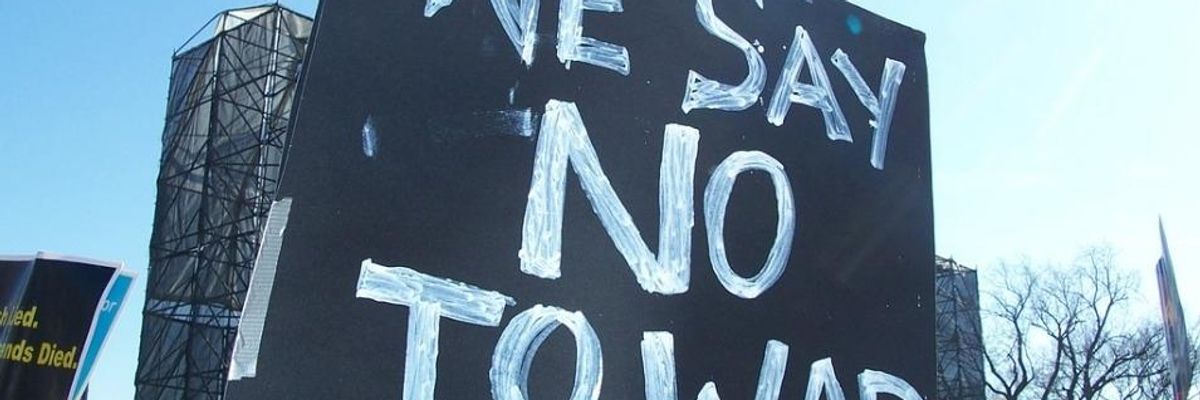The backing of so-called "moderate" rebels is a stated cornerstone of Obama's expanding air bombardments on Syria, and Congress last month cleared the path for aiding, arming, and training armed groups in Syria, which have yet to be fully identified to the U.S. public. But as the expanding U.S.-led war on that country enters its second week, and the war on Iraq enters its eighth, analysts warn that U.S. military entanglement is built around myths and falsehoods regarding who these armed groups are, what support they can actually offer, and what they want.
"The proposition that there is a moderate Syrian opposition with enough military potential and--even more importantly--popular support inside Syria to overthrow the Assad government is a myth," write Flynt Leverett and Hillary Mann Leverett for Consortium News. "To claim in addition that these mythical moderate oppositionists can take on and defeat the Islamic State is either blatantly dishonest or dangerously delusional."
Similar skepticism can be found across the political spectrum, including hawkish national security columnist David Ignatius, who wrote in the Washington Post, "The problem is that the 'moderate opposition' that the United States is backing is still largely a fantasy."
Experts charge that Obama is deluded to think that the rebels back U.S. interests. Reese Erlich writes:
Contrary to conservative criticism, the Obama administration has tried to create pro-U.S. civilian and armed groups. Obama has failed, not because of "lack of leadership" but because Syrians won't accept U.S. policy. In my interviews inside Syria and neighboring countries, Syrian rebels and opposition activists made clear they opposed the U.S. wars in Iraq and Afghanistan, and Washington's total support for Israel. Every Syrian I ever met wants Israel to return the Golan Heights seized in 1967, for example, but the U.S. isn't interested in having that discussion.
Meanwhile, American allies such as Saudi Arabia have armed extremists such as the al-Nusra Front, a group affiliated with al-Qaida. Saudi Arabia's ultra-right-wing interpretation of Islam shares many ideological similarities with al-Nusra and IS. Yet the U.S. plans to have Saudi Arabia train "moderate" Syrian rebels, which is like asking Al Capone to train Chicago police cadets.
Furthermore, it is not clear that leaders of the Syrian armed groups the U.S. points to as its closest allies even back the expanding U.S. war. Foreign Policy writer David Kenner writes:
America's most plausible allies on the ground in Deir Ezzor, however, remain critical of the international effort. Foreign Policy interviewed six FSA commanders from the province who are currently exiled by the Islamic State and hiding outin southeastern Turkey. All of them were arrested at some point by the jihadist group; some were tortured. They all agree that the U.S. airstrikes in their home country are a bad idea.
FSA fighters and commanders complained to Foreign Policy that they have received no increase in support since the international effort to combat the Islamic State began, despite promises from the Obama administration that the United States would begin supplying arms to the rebels. The FSA fighters also disparaged the airstrikes, saying they would mainly kill civilians and give the Assad regime a chance to gain ground
The criticism of a strategy which relies on "moderate" rebels is just one of several deep concerns shared by analysts. Phyllis Bennis warns that, ultimately, there is no military solution to the rapid spread of ISIS. She writes:
[Y]ou can't bomb extremism out of existence. The U.S. bombs do not fall on "extremism," they are falling on Raqqah, a 2,000 year-old Syrian city with a population of more than a quarter of a million people - men, women and children who had no say in the take-over of their city by ISIS. The Pentagon is bombing targets like the post office and the governor's compound, and the likelihood of large number of civilian casualties as well as devastation of the ancient city, is almost certain.
President Obama was right when he said there is no military solution to the ISIS crisis. Bombing Syria, without Congressional authorization, without United Nations approval, in direct opposition to the stated position of Syria's government, will only make that crisis worse. It will give ISIS and its allies a new basis for recruitment, it will strengthen the repressive Syrian government, it will undermine Syria's struggling non-violent opposition movement, and it will further tighten the links between ISIS supporters in Syria and in Iraq.

